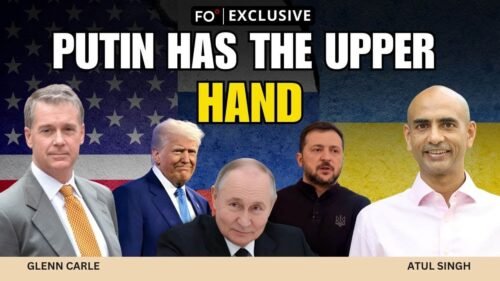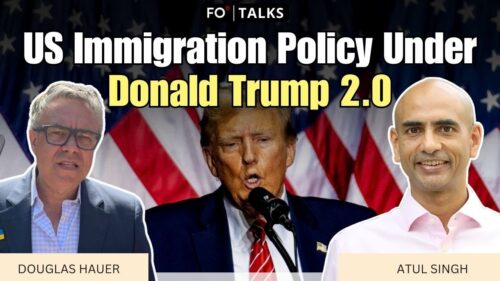Editor-in-Chief Atul Singh and retired CIA Officer Glenn Carle go through key developments in September. They begin by looking at US President Donald Trump’s appearance at the UN. In his speech, Trump boasted of ending seven wars, quipped about the escalator stopping abruptly and a teleprompter that was not functioning. He dismissed climate change as “a con job” and also criticized the UN as ineffective, claiming it neither helped him nor reached its potential. Atul points out the irony of Trump downplaying climate change precisely when the Arctic shipping route is gaining momentum.
The geopolitical rise of the Arctic route
This segues into a discussion on shipping routes and global trade. The speakers outline the objective facts: Attacks by Yemen’s Houthi militant group have made the Red Sea corridor through the Suez Canal and Bab el-Mandeb Strait increasingly dangerous. Many ships are now rerouting around the Cape of Good Hope and Cape Agulhas, the southern tips of Africa, which significantly increases costs and travel times.
Against this backdrop, the Northern Sea Route (NSR) along Russia’s Arctic coast is gaining importance. In 2016, only 19 ships made the journey via the NSR. By 2024, that number had risen to 92. This growth is spectacular.
Much of this traffic involves Russian commodity exports, especially natural gas, but container shipping is beginning to take off. A voyage from Ningbo, China, to Felixstowe, United Kingdom, via the NSR takes 18 days — less than half the time required to sail around Africa. Once the dream of British explorers, this Polar Silk Road is now a very real Chinese ambition.
Xi’s parade and global optics
The conversation shifts to China, where on September 3, Chinese President Xi Jinping presided over an 80th anniversary Victory Day Parade commemorating the end of the Second Sino-Japanese War. China views this triumph as the true conclusion of World War II. Xi hosted two prominent allies: Russian President Vladimir Putin and North Korean leader Kim Jong Un. The parade was “very impressive” — much more so than Trump’s military parade this June.
In the lead-up, Xi convened a summit of the Shanghai Cooperation Organisation (SCO). Atul highlights the optics of Indian Prime Minister Narendra Modi clasping Putin’s hand and walking toward Xi, remarking jokingly, “Talk about love — one hopes it’s brotherly.” The imagery of Xi, Putin and Modi together generated international headlines, reflecting the shifting balance of power in Eurasia.
US domestic policy: autism and immigration
Back home, the Trump administration stirred controversy when Health Secretary Robert Kennedy Jr. joined Trump in linking Tylenol and vaccines to autism. Trump announced a sweeping initiative to study the causes of brain disorders. Atul muses that his own “brain fog” and lapses in intelligence could now potentially be blamed on Tylenol.
Immigration policy has also undergone dramatic change. The administration imposed a $100,000 fee per H-1B visa application. Note that this fee does not guarantee visa approval. With the United States Citizenship and Immigration Services granting 85,000 such visas yearly, this Trump administration measure effectively ends the H1-B program, particularly hurting Indians who have availed of the lion’s share of this type of visa. Importantly. FOI had predicted tighter immigration controls as early as April 2024.
Europe, gold and tech
Briefly touching on European events, Atul cites Russian drones entering Polish and Romanian airspace, Russian MiG-31 fighter jets buzzing Estonia for 12 minutes before interception by NATO’s Italian F-35 aircraft and temporary closures of airports in Oslo, Norway, and Copenhagen, Denmark due to drone sightings. The EU and NATO are facing many defense and strategic challenges.
The uncertain geopolitical situation has caused gold prices to hit a historic high of $3,500 per troy ounce. In the corporate world, Google survived the greatest antitrust case since tech giant Microsoft’s battles in the 2000s. Also, Nvidia poured resources into OpenAI, signaling the deepening links between top tech companies..
Three core issues for September
Atul and Glenn segue into this episode’s main subjects by identifying three overarching issues that defined September 2025:
- The Divided, Not United, States of America
- Dollar Will Continue to Lose Value
- Economic Pain and Political Turmoil Around the World
[Lee Thompson-Kolar edited this piece.]
The views expressed in this article/video are the author’s own and do not necessarily reflect Fair Observer’s editorial policy.













































Comment